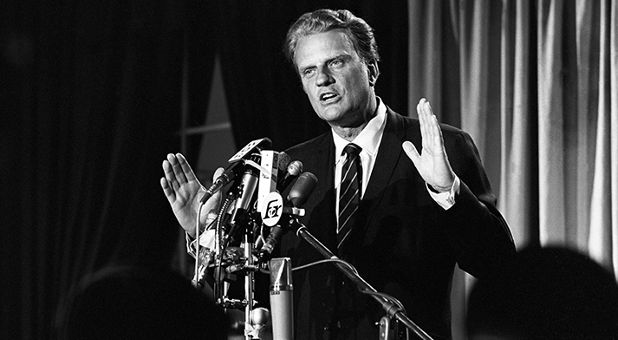Evangelist Billy Graham lived 99 years, wrote 30 books, met with 12 sitting American presidents and preached the gospel to millions. But when he is buried this Friday, March 2, in his hometown of Charlotte, North Carolina, he will be remembered not only as a world-changing hero of faith but as a humble preacher whose personal integrity set the gold standard for every minister in this country.
Why was this man so respected? How was he able to keep his ministry free from scandal for more than 75 years?
In 1948, when Graham was just 30 years old, he and his small ministry team met for Bible study and prayer at a tiny motel in Modesto, California. The other men in that meeting including assistant evangelist Grady Wilson, singer George Beverly Shea and song leader Cliff Barrows. Graham challenged them to pray about what codes of behavior they needed to adopt in order to keep the ministry clean.
The results of that meeting were profoundly prophetic. The men outlined what would become “the Modesto Manifesto”—a list of core ministry values that became the guiding principles of the Billy Graham Evangelistic Association. The BGEA was founded two years later, in 1950, just one year after media coverage of Graham’s eight-week gospel campaign in Los Angeles made him a household word.
Here are the four key components of the Modesto Manifesto, along with notes that Cliff Barrows jotted down in their meeting:
- Honesty: “It was resolved that all communications to media and to the church would not be inflated or exaggerated. The size of crowds and the number of inquirers would not be embellished for the sake of making BGEA look better.”
- Integrity: “It was resolved that financial matters would be submitted to a board of directors for review and facilitation of expenditures. Every local crusade would maintain a policy of ‘open books’ and publish a record of where and how monies were spent.”
- Purity: “It was resolved that members of the team would pay close attention to avoiding temptation—never being alone with another woman, remaining accountable to one another, etc. A practice of keeping wives informed of their activities on the road and helping them feel a part of any and all crusades they undertook would be encouraged.”
- Humility: “It was resolved that members of the team were never to speak badly of another Christian minister, regardless of his denominational affiliation or differing theological views and practices. The mission of evangelism includes strengthening the body of Christ as well as building it!”
Graham has always been a spiritual hero to me for this reason. Early in his ministry—in fact, before he ever became famous—he realized that his ministry was a stewardship from God and that he could not run it any way he wanted. He had to manage it according to clear biblical principles.
Graham never forgot his humble roots, and he never let popularity change him into an egotistical monster. Even though he was invited to dine with presidents, queens and celebrities, his passion was taking the message of Christ to the common person. And when an usher tried to segregate black and white sections of an auditorium in Chattanooga, Tennessee, in 1953, Graham removed the barriers himself.
“I am not a great preacher, and I don’t claim to be a great preacher,” he once said. “I’ve heard great preaching many times and wished I was one of these great preachers. I’m an ordinary preacher, just communicating the gospel in the best way I know how.”
He also carried with him a healthy fear that he might try to touch God’s glory or take credit for evangelistic results.
Graham said: “So many people think that somehow I carry a revival around in a suitcase, and they just announce me and something happens—but that’s not true. This is the work of God, and the Bible warns that God will not share His glory with another. All the publicity that we receive sometimes frightens me because I feel that therein lies a great danger. If God should take His hand off me, I would have no more spiritual power. The whole secret of the success of our meetings is spiritual—it’s God answering prayer. I cannot take credit for any of it.”
So much of what we call ministry today has been compromised by ego, marketing and man-made agendas. Some of our own “Spirit-filled” preachers are happy to sell a healing or a financial miracle for $29.95. Others claim spiritual superiority because they have the largest following on social media or because so many lined up to attend their packed conferences.
We have exchanged honesty, integrity, purity and humility for hype, fake anointing, manipulated photos, inflated attendance reports, sensuality and boastful swagger. God forgive us.
Billy Graham raised the bar for all ministers. I pray we will never forget his legacy.
See an error in this article?
To contact us or to submit an article
























